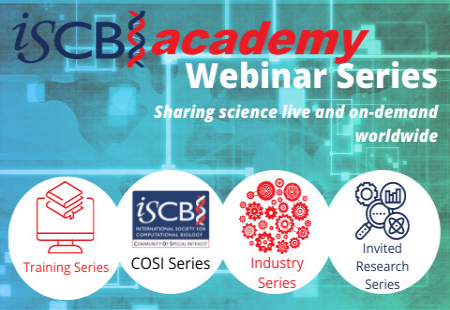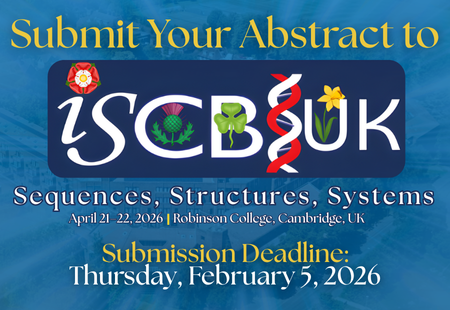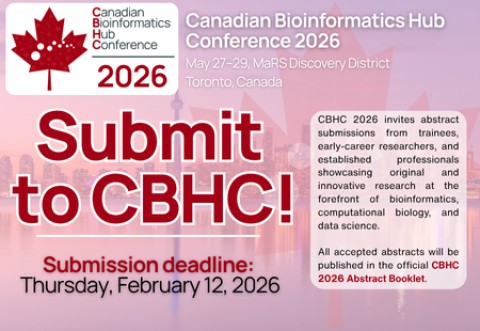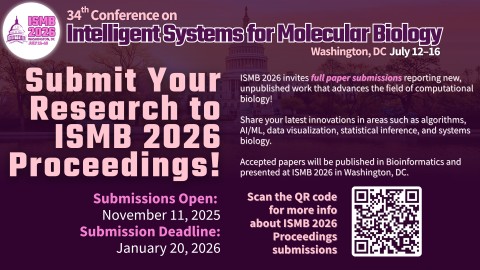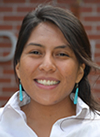| Go directly to: Friday - December 7 | Saturday - December 8 |
| WEDNESDAY – December 5, 2018 |
| START TIME |
END TIME |
SESSION TYPE |
| 04:00 pm |
06:00 pm |
REGISTRATION |
| |
| THURSDAY – December 6, 2018 |
| START TIME |
END TIME |
SESSION TYPE |
| 08:00 am |
06:00 pm |
Registration |
| 08:00 am |
09:00 am |
Breakfast |
| 09:00 am |
09:45 am |
Keynote 1
ZHIYONG LU, Ph.D.
Deputy Director for Literature Search
National Center for Biotechnology Information (NCBI)
Senior Investigator, NCBI/NLM/NIH
Machine Learning in Biomedicine: from PubMed Search to Autonomous Disease Diagnosis
|
| 09:45 am |
09:55 am |
OP01
Proteomics of natural bacterial isolates powered by deep learning-based de novo identification
Presenting Author:
Samuel Payne, Brigham Young University |
| 09:55 am |
10:05 am |
OP02
A platform for community-scale transcriptome-wide association studies
Presenting Author:
YoSon Park, Perelman School of Medicine University of Pennsylvania |
| 10:05 am |
10:15 am |
OP03
Harmonizing and Analyzing Clinical Trials Data in the AHA Precision Medicine Platform
Presenting Author:
Carsten Goerg, University of Colorado |
| 10:15 am |
10:25 am |
OP04
anexVis: visual analytics framework for analysis of RNA expression
Presenting Author:
Diem-Trang Tran, University of Utah |
| 10:25 am |
10:45 am |
Break |
| 10:45 am |
11:15 am |
Keynote 2
AARON VON HOOSER, PhD
Principal Scientist
Computational Biology
PatientsLikeMe, Inc.
Building a Learning System that Helps Individuals to Thrive by Connecting Their Experiences and Goals with Molecular Measures of Health |
| 11:15 am |
11:25 am |
OP05
The characterization of different cell types using the Benford law
Presenting Author:
Sne Morag, Ariel University |
| 11:25 am |
11:35 am |
OP06
Use of metadata and Bag-of-words to map measurements across observational study data
Presenting Author:
Laura Stevens, University of Colorado Anschutz Medical Campus |
| 11:35 am |
11:45 am |
OP07
ExtRamp: A novel algorithm for extracting the ramp sequence based on the tRNA adaptation index or relative codon adaptiveness
Presenting Author:
Justin Miller, Brigham Young University |
| 11:45 am |
11:55 am |
OP08
Using machine learning algorithms for classification of medulloblastoma subgroups based on gene expression data
Presenting Author:
Sivan Gershanov, Ariel University |
| 12:00 pm |
04:00 pm |
-->Ski Break |
| 04:00 pm |
04:30 pm |
Keynote 3
JOSLYNN S. LEE, Ph.D.
Science Education Fellow
Howard Hughes Medical Institute
Training and Engaging URM Undergraduate Students in Genomics Research Through a Place-based Microbiome Research Project |
| 04:30 pm |
04:40 pm |
OP09
A human disease network from gene-publication relationships on PubMed
Presenting Author:
Edward Lau, Stanford University |
| 04:40 pm |
04:50 pm |
OP10
Transcriptome analysis of cancer adjacent normal tissues reveal genes co-expressed with LINE elements
Presenting Author:
Mira Han, University of Nevada Las Vegas |
| 04:50 pm |
05:00 pm |
OP11
Highly Accurate Computational Characterization of Protein Kinase Family-specific Phosphorylation Sites
Presenting Author:
Chen Li, ETH Zürich |
| 05:00 pm |
05:10 pm |
OP12
ORCHID: a method for detecting short-range chromatin interactions in high-resolution 5C and Hi-C datasets
Presenting Author:
Fei Ji, Massachusetts General Hospital |
| 05:10 pm |
05:30 pm |
Break |
| 05:30 pm |
05:40 pm |
OP13
Using Adversarial Deep Neural Networks to Remove Nonlinear Batch Effects from Expression Data
Presenting Author:
Jonathan Dayton, Brigham Young University |
| 05:40 pm |
05:50 pm |
OP14
Med2Mech: Neural-Symbolic Representation of Molecular Mechanisms Underlying Pediatric Disease
Presenting Author:
Tiffany Callahan, University of Colorado Anschutz Medical Campus |
| 05:50 pm |
06:00 pm |
OP15
A Machine Learning Classifier for Assigning Individual Patients with Systemic Sclerosis to Intrinsic Molecular Subsets
Presenting Author:
Jennifer Franks, Geisel School of Medicine at Dartmouth |
| 06:30 pm |
09:30 pm |
Dinner - Il Poggio |
| - top - |
| FRIDAY – December 7, 2018 |
| START TIME |
END TIME |
SESSION TYPE |
| 08:00 am |
06:00 pm |
Registration |
| 08:00 am |
09:00 am |
Breakfast |
| 09:00 am |
09:45 am |
Keynote 4
DEBORAH L. MCGUINNESS, PhD
Tetherless World Senior Constellation Chair
Professor of Computer Science and Cognitive Science
Rensselaer Polytechnic Institute
Semantic Data Resources Enabling Science: Building, Using, and Maintaining Ontology-Enabled Biology Data Resources |
| 09:45 am |
09:55 am |
OP16
A Data Quality Testing Tool for Cross-institutional OMOP Electronic Health Record Data Repositories
Presenting Author:
Timothy Bergquist, University of Washington |
| 09:55 am |
10:05 am |
OP17
Comparative Analysis of Germline Microsatellites in the 1,000 Genomes Project
Presenting Author:
Nicholas Kinney, Virginia College of Osteopathic Medicine |
| 10:05 am |
10:15 am |
OP18
Unbiased Pathway Detection Expands Cancer Pathways
Presenting Author:
Chih-Hsu Lin, Baylor College of Medicine |
| 10:15 am |
10:25 am |
OP19
A systems biology approach to define essential kinases in small cell lung cancer
Presenting Author:
Jihye Kim, University of Colorado Anschutz Medical Campus |
| 10:25 am |
10:45 am |
Break |
| 10:45 am |
11:15 am |
Keynote 5
DAVID ASTLING, PhD
Scientist, Bioinformatics
SomaLogic Inc.
Beyond Genomics: Deriving Actionable Health Insights from the Human Proteome |
| 11:15 am |
11:25 am |
OP20
Clustering of Protein Conformations using Parallelized Dimensionality Reduction
Presenting Author:
Arpita Joshi, University of Massachusetts, Boston |
| 11:25 am |
11:35 am |
OP21
PredHPI: an integrated web-server platform for the prediction and visualization of host-pathogen interactions
Presenting Author:
Rakesh Kaundal, Utah State University |
| 11:35 am |
11:45 am |
OP22
Searching for translatable alternative splice isoforms in the human proteome
Presenting Author:
Maggie Pui Yu Lam, University of Colorado Anschutz Medical Campus |
| 11:45 am |
11:55 am |
OP23
Text Mining Novel Disease- and Drug-Specific Pathways
Presenting Author:
Minh Pham, Baylor College of Medicine |
| 12:00 pm |
04:00 pm |
-->Ski Break |
| 04:00 pm |
04:30 pm |
Keynote 6
NICOLE A. VASILEVSKY, Ph.D.
Research Assistant Professor
Department of Medical Informatics and Clinical Epidemiology (DMICE)
Oregon Health & Science University
LOINC2HPO: Improving Translational Informatics by Standardizing EHR Phenotypic Data Using the Human Phenotype Ontology |
| 04:30 pm |
04:40 pm |
OP24
Optimizing nontuberculous mycobacteria (NTM) de novo genome assemblies for application in clinical case studies
Presenting Author:
Sara Kammlade, National Jewish Health |
| 04:40 pm |
04:50 pm |
OP25
REAL-neo, a comprehensive neoantigen prediction and prioritization pipeline using tumor sequencing data
Presenting Author:
Yesesri Cherukuri, Mayo Clinic |
| 04:50 pm |
05:00 pm |
OP26
Measuring chromosome conformation
Presenting Author:
Brian Ross, University of Colorado Anschutz Medical Campus |
| 05:00 pm |
05:10 pm |
OP27
Modeling the Structure of BioGRID PPI Networks
Presenting Author:
Sridevi Maharaj, University of California-Irvine |
| 05:10 pm |
05:30 pm |
Break |
| 05:30 pm |
05:40 pm |
OP28
Addressing the compositional data problem in sequencing with a novel, robust normalization method
Presenting Author:
James St. Pierre, University of Toronto |
| 05:40 pm |
05:50 pm |
OP29
A Case Study on the Effects of Noisy, Long-read Correction Approaches on Assembly Contiguity
Presenting Author:
Brandon Pickett, Brigham Young University |
| 05:50 pm |
06:00 pm |
OP30
Integrative analysis of transcriptomics and proteomics to detect novel protein isoforms from alternatively spliced transcripts induced by SF3B1 spliceosomal mutations
Presenting Author:
Kelsey Nassar, University of Colorado Anschutz Medical Campus |
| 06:30 pm |
08:30 pm |
Poster Session |
| - top - |
| SATURDAY – December 8, 2018 |
| START TIME |
END TIME |
SESSION TYPE |
| 08:00 am |
11:00 am |
Registration |
| 08:00 am |
09:00 am |
Breakfast |
| 09:00 am |
09:30 am |
Keynote 7
BENJAMIN M. GOOD, PhD
Consultant
Lawerence Berkeley National Labs
Integrating Pathway Databases with Gene Ontology Causal Activity Models |
| 09:30 am |
09:40 am |
OP31
Exploring the Fabric of Breast Cancer Using Gene Sets
Presenting Author:
Judith Blake, The Jackson Laboratory |
| 09:40 am |
09:50 am |
OP32
Measuring and Protecting the Sensitive Linking Information Leakage Across Epigenetic and Transcriptomics Datasets Through Genotype and Assay Prediction
Presenting Author:
Arif Harmanci, University of Texas Health Science Center |
| 09:50 am |
10:00 am |
OP33
Education, Networking and Building Next Generation Prototypes -- Hackathons and Analyzeathons for Bioinformaticians, Biomedical Informaticians and Computational Biologists!
Presenting Author:
Ben Busby, NCBI |
| 10:00 am |
10:10 am |
OP34
Alternative Splicing of Single Cells in Squamous Cell Lung Cancer Premalignancy
Presenting Author:
Hyunmin Kim, University of Colorado Anschutz Medical Campus |
| 10:10 am |
10:20 am |
OP35
Inferring trade-offs in protein folding networks
Presenting Author:
Sebastian Pechmann, Université de Montréal |
| 10:20 am |
10:40 am |
Break |
| 10:40 am |
10:50 am |
OP36
Fully Bayesian model for non-random missing data in qPCR
Presenting Author:
Valeriia Sherina, University of Rochester Medical Center |
| 10:50 am |
11:00 am |
OP37
Homologous Inter-Domain Segments in Protein Families
Presenting Author:
Dylan Barth, University of Nevada Las Vegas |
| 11:00 am |
11:10 am |
OP38
Integrating extracted relations into existing knowledge bases
Presenting Author:
Harrison Pielke-Lombardo, University of Colorado |
| 11:10 am |
11:20 am |
OP39
The Use of Scientific Ignorance to Drive Literature-Based Discovery in Prenatal Nutrition Across Disciplinary Boundaries
Presenting Author:
Mayla Boguslav, University of Colorado Anschutz Medical Campus |
| 11:20 am |
11:30 am |
OP40
Governance Innovations for Promoting Cross-institutional Electronic Health Data Sharing
Presenting Author:
Kari A. Stephens, University of Washington |
| 11:30 am |
12:00 pm |
Keynote 8
KIRK E. JORDAN, PhD
IBM Distinguished Engineer
Data Centric Solutions
IBM T.J. Watson Research & Chief Science Officer
Algorithm Exploitation & Evolving AI/Cognitive Examples on IBM’s Data Centric Systems |
| 12:00 pm |
12:15 pm |
Closing Raffle and Awards |
![]() Guidelines for Exhibitor Track Presentations (pdf)
Guidelines for Exhibitor Track Presentations (pdf)
